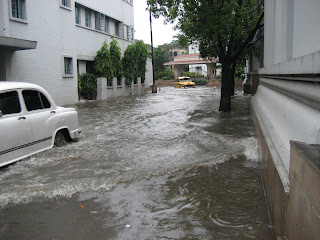It's been far too long since my last post, but I've been so absorbed at work, and at play, trying to live the life of a Parisian, that I've almost come to think that the world I left behind in NYC is simply an illusion.
But to snap back into reality for a moment--here is a glimpse into my life:
The OECD(
http://www.oecd.org) has been amazing to work with. It is a truly ideal setting, with an enormous staff of inspired, forward-thinking, internationally diverse, and talented individuals. There is a true sense that we are all working towards something great--despite wide divergence on the subject matter and focus within the different directorates and divisions of the organization.

The building is located in la Défense, the major business district just outside of the city proper--an area of looming glass skyscrapers and modern art surrounding a plaza that looks like something out of a science fiction movie. Each day I work among the throngs of Parisian businessmen(and women!), the center of Paris' economic life and the locus of its productive workforce--a purposefully constructed business district which is far more focused than in any other city I have every visited.
I have been placed in the Science, Technology, and Industry Directorate, in the Information Communications Technology division, one of the larger divisions within OECD. The division is responsible for tracking and analyzing the worldwide progress of technical development, and what firms, governments, and universities are doing in the field. I am working on the IT Outlook 2008--which is a biannual report detailing a wealth of data on the ICT industry and is one of the preeminent primary sources for statistical data in the field as well as an invaluable, and influential, tool for policy makers.

My assignment right now is twofold--I'll be writing a module in the ITO that examines the emerging technologies that are currently being researched worldwide, and what their impact will be, especially in the developing world. A subsection of this module will be a report on the advancements in 'green' technology, and this will likely also be developed into a standalone paper a bit more in-depth than what will be published in the ITO. So far, it's been research, research, research, and while it's very challenging, it's incredibly stimulating--and quite intriguing to think that the work I'm doing now may have an impact on future policy.
Besides work, Paris has been treating me well--I bought a motorscooter so I can get around like a Parisian(i.e. very fast, and always *this close* to being run over by a taxi). I've managed to visit quite a few of the city's amazing parks, including the gorgeous Parc des Buttes Chaumont. I'm enjoying the free time of summer by going running everyday in the nearby Parc Monceau. I spent an amazing evening with two Canadians and an Australian who were passing through Paris, sitting on the steps of La Basilique du Sacré Coeur, drinking red wine and listening to the musicians who bring their guitars there every night.

Sadly, however, my own guitar did not make it to Paris in one piece. It was completely destroyed when British Airways finally delivered it to me a day and a half late. The pictures are too frightful to post. However, that devastating turn of events quickly became an opportunity for me to visit the famed Rue de Douai, near Pigalle, an amazing street in the heart of Paris with guitar shop after guitar shop--literally over 30 of them within less than a kilometer. A guitar lover's paradise. I bought myself a new one, and I can happily report that there is nothing quite as enjoyable as playing a guitar on a park bench in Paris in the summer.
Finally, I've made friends with a group of French students who have all just finished lycée. They are helping me with my French and I'm helping them improve their already impressive English. Last weekend, they took me to an enormous outdoor fête at Parc du Champ-de-Mars, the large greenspace below and behind la Tour Eiffel. Tens of thousands of French high school students gathered there, drinking, singing, shouting, dancing, and generally partying-hard as they celebrated the end of le bac, the high school exit exam. It was incredible. That night, I also managed to perfect my French accent on the phrase "Ouru de vous rencontre," or "Nice to meet you," as I moved around the crowd and shared in the massive jubiliation of the Parisian youth until early in the morning.
This is, in a nutshell, my Paris experience thus far, and I eagerly await more. To Leitner scholars and dear readers--be well. À bientôt.





































